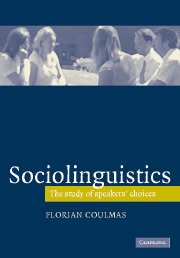Book contents
- Frontmatter
- Contents
- 1 Introduction: notions of language
- Part I Micro-choices
- 2 Standard and dialect: social stratification as a factor of linguistic choice
- 3 Gendered speech: sex as a factor of linguistic choice
- 4 Communicating across generations: age as a factor of linguistic choice
- 5 Choice and change
- 6 Politeness: cultural dimensions of linguistic choice
- Part II Macro-choices
- Glossary of terms
- References
- Internet resources
- Index
- References
4 - Communicating across generations: age as a factor of linguistic choice
Published online by Cambridge University Press: 05 June 2012
- Frontmatter
- Contents
- 1 Introduction: notions of language
- Part I Micro-choices
- 2 Standard and dialect: social stratification as a factor of linguistic choice
- 3 Gendered speech: sex as a factor of linguistic choice
- 4 Communicating across generations: age as a factor of linguistic choice
- 5 Choice and change
- 6 Politeness: cultural dimensions of linguistic choice
- Part II Macro-choices
- Glossary of terms
- References
- Internet resources
- Index
- References
Summary
You've had your time, I'll have mine.
T. S. Eliot, The Waste Land… a fashionable old man is almost a contradiction in terms.
Dwight Bolinger, Language – The Loaded WeaponTime depth
People come and go; words come and go; and languages come and go. How are these processes connected? Connected they are, for how could words be coined, passed on and discarded if there were no speakers to do the coining, passing on and the discarding? Language is a tradition; otherwise we would not understand one another. It must be handed down from one generation to the next in a way that allows members of coexisting generations to communicate. But it is not handed down unaltered. For each generation recreates the language of its predecessors. Cases of language demise – the discontinuation of a tradition – provide compelling evidence of the intergenerational gap. In the event, speakers of generation Gn + 1 fail to use language Lα in the same way generation Gn did. When this happens there is often a continuum of decreasing use and proficiency in that language that correlates with succeeding generations of speakers. Eventually, Lα ceases to exist as a spoken language because no one chooses to speak it and no one can speak it anymore.
- Type
- Chapter
- Information
- SociolinguisticsThe Study of Speakers' Choices, pp. 52 - 67Publisher: Cambridge University PressPrint publication year: 2005
References
- 1
- Cited by

